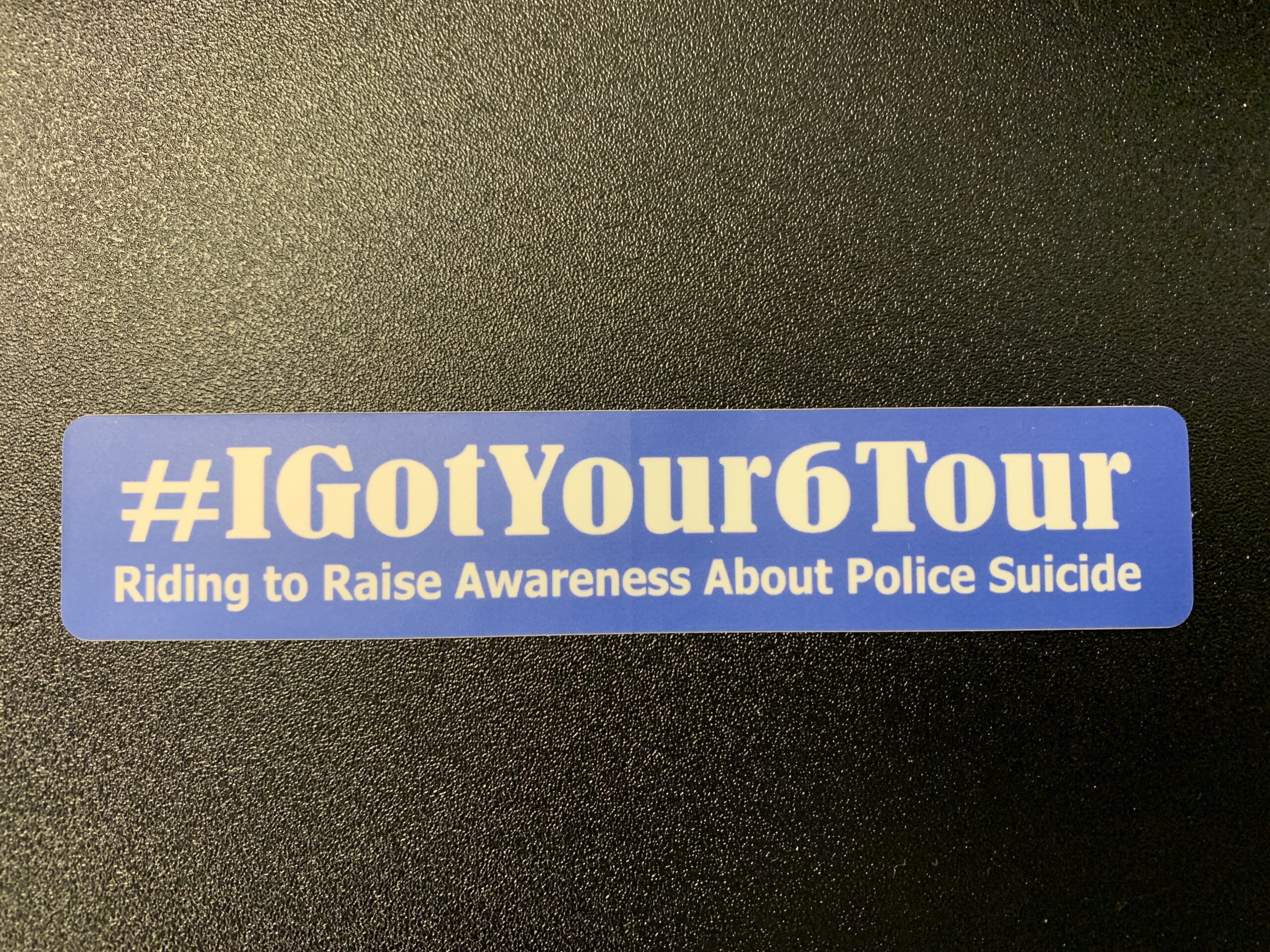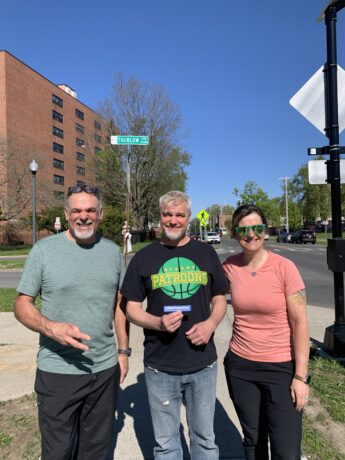
For May’s Mental Health Awareness Month, Unity House staffer Samantha Shipherd shares about meeting bicyclists on a mission.
“I got your six”
Often heard in the military, “I got your six” is a way of saying “I’ve got your back.”
It comes from the days of air combat. Before there were sensors to show where the danger was, threats were referred to by their position on a clock face. If you heard, “Enemy! Two o’clock!!” you would know where to look. Your “six” was behind you, a blind spot, where there is vulnerability. For someone to say, “I got your six” is to say you are part of a team. You are looking out for each other. In essence, it means, “You are not alone. I am here with you.”
For married couple Jeff and Wendy, “I got your six” is personal. It goes beyond the battlefield, to the everyday.
Jeff is retired from law enforcement. Wendy works in industrial design. Among the things they have in common, is a connection to suicide.
Wendy lost a family member to suicide. Jeff lost two partners from his Sheriff days to police suicide. Retired from the National Guard Reserves, Jeff is familiar with the mental health issues and potential for PTSD that law enforcement and veterans face.
Another thing Jeff and Wendy share is a love of the outdoors, in particular, bicycling. They embark on multi day bike trips with a purpose. That is how I met them: when they arrived in Albany by bicycle, total strangers, to spend the night in my house.
They had been bicycling for days, since leaving their home in Detroit, pedaling across New York until they reached Albany, where they would spend one night before getting on the Empire State Trail to New York City, their final destination. Their stop at my house was made possible through Warm Showers, a website that connects cyclists with, well, warm showers. Hosting Warm Showers cyclists means offering a place to sleep, a chance to clean up, and maybe a meal for the next leg of the journey.
When my husband suggested we sign up for Warm Showers, I thought he was a little crazy, but that hint of insanity is one of the things I love about him. Even though I think it’s a terrible name, I ‘warmed’ to the idea. I saw it as a chance to offer the kind of hospitality you hope exists in the world. We agreed to receive our first warm showers guests, who turned out to be Jeff and Wendy.
Over dinner on our patio, after warm showers, our guests shared the reason for their bike trip, what they call the “I Got Your 6 Tour.” They are riding to raise awareness about police suicide.
Jeff explained how trauma can compound and those who work in law enforcement are especially at risk of mental health issues in the workplace. Like many, Jeff believes that the death of an officer by suicide should be considered a death in the line of duty, with corresponding survivor benefits.
Talking about suicide and the ways it impacts those involved is important for preventing further suicides and ending the stigma around the topic. Recognizing this is the first step in making change. Being open about mental health, talking about the trauma law enforcement face, and the long-term impact on people, relationships, and families is Jeff and Wendy’s mission.
Jeff knows what he is talking about: while working in law enforcement Jeff had the realization his mental health was affecting the way he did his job. He did not like what he saw. Jeff recognized he was in danger and knew he had to make a change. Jeff told his superior he was done in the field. He knew the risks if he kept silent about his mental health. Fortunately, Jeff’s team reacted appropriately. They re-assigned him and worked with Jeff on a plan to treat his mental health, just like you would do for someone who broke their leg on the job.
With this act, Jeff was not only saving his own life, he was making it easier for others to take that same step. He is a trail blazer and a stigma buster. We can talk about trauma rather than ‘stuff it in a box’ as Jeff had been instructed when he was a rookie. As he told me, “There is no way to contain what’s in that box.”
Some of Jeff’s colleagues told him that his coming forward gave them the confidence to seek help. His experience and the affirming way his superiors dealt with his needs, was a powerful sort of permission slip to those he worked with.
Judging by their photos on social media, Jeff and Wendy’s bike tour takes them to some beautiful spots, but really it’s about the people rather than the places. Theirs is an advocacy tour: mile by mile, person to person, they share their experience. They are having the kinds of conversations you hope exist in the world.
Wendy and Jeff were excellent guests. They made me want to get on my bike and explore more of our great state, even Schenectady, where they raved about the lunch they had at Civitello’s. Even though our visit was short, our conversations gave me a lot to think about, including my perceptions of law enforcement. I thought about my interactions -good and bad- with police and how they might have been influenced by my privilege. I reflected on how people with mental health issues are sometimes treated by law enforcement and in our society in general. Again and again, I came back to how challenging a job law enforcement must be and the importance of reducing stigma, for everyone, around mental illness.
Jeff and Wendy are welcome back anytime. My husband and I will keep hosting warm showers cyclists when we can. We’ll probably tell them about our first guests who ride to raise awareness about police suicide. How the end point of their trip is Battery Park in lower Manhattan, where they can see the Statue of Liberty, a beacon of freedom and hope. Jeff and Wendy have inspired me, and not just to talk to more strangers. I hope their bike trips will lead to more conversations about mental health, if only so we can say to more often to each other “You are not alone.” In other words, “I got your six.”
Important reminder:
If you are struggling or in crisis, help is available 24/7. In NY call (800) 597-9491 or TEXT Got5 to 741741
The National Suicide Prevention Lifeline is 1-800-273-TALK (8255)
See also suicidepreventionlifeline.org